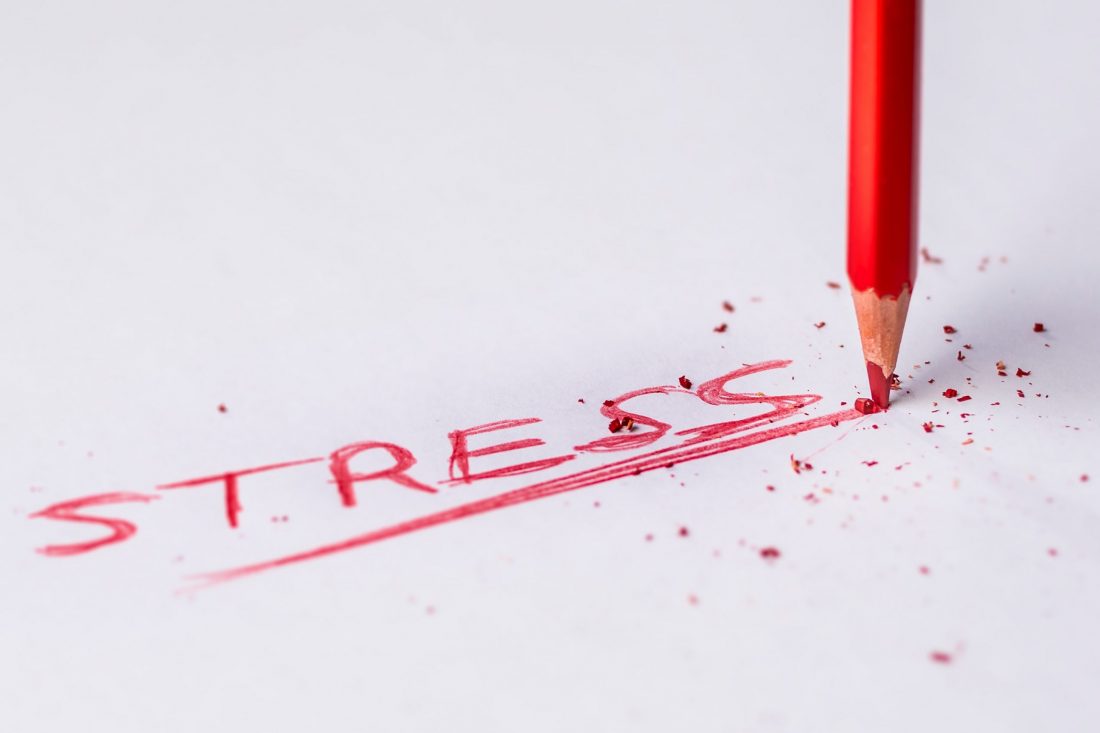Stress is a disturbed state of self-regulation (homeostasis) . It is a specific syndrome triggered by non-specific impulses (stressors) , to which the body is not adapted. Its origin can be physical ( injury, surgery, intoxication, UV, etc. ), psychological (psychological pressure, fear, etc. ) and can generate adjustment disorders such as anxiety, sleep disorders, mild depression to moderate, cognitive disorders, overwork or exhaustion syndrome.
What are “stress adjustment disorders”?
Stress, like pain, is indeed a physiological alert that allows the body to adapt to changes in the environment and to make the most of it. The stress response involves all of the coping systems and the support system . The fragility of only one of these systems thus endangers the whole organism .
In case of good stress management:
Repeated exposure to stress results in the activation of the hypothalamic-pituitary-adrenal (corticotropic) axis, resulting in de facto, through feedback, in a physiological secretion of cortisol .
In the event of poor stress management:
The organism is then in a situation of maladjustment . In this case, repeated exposure to stress leads to dysregulation of the hypothalamic-pituitary-adrenal cortex, resulting in functional hypercortisolism (hypercorticism), with or without disturbance of the secretion of neurotransmitters, brain inflammation, cerebral trophic disorders, etc. slow and gradual onset. This results in adjustment disorders with neuropsychic symptomatology . At this clinical stage, the individual is in the process of exhaustion, draws on reserves and “goes into debt”. It passes over time through several phases, which may result, if no therapeutic action is taken, in a state of proven or established exhaustion ( burn out ).
Distinguishing between the different types of exhaustion in stress adjustment disorders
The current exhaustion:
In a state of exhaustion, cortisol is found in excess . This excess cortisol is responsible for anxiety and / or depression generating a dopamine and / or serotonin deficiency that can cause sleep disorders or cognitive disorders ( memory, attention, concentration ) with partial mismatch as well as instability. one or more regulation and support systems.
The proven exhaustion:
In a state of proven exhaustion, cortisol is found in deficit. This cortisol insufficiency is responsible for depression generating a dopamine deficit which can cause an impairment of sleep, more or less disabling cognitive disorders, disabling physical and mental fatigue with complete disadaptation, as well as an imbalance of all the systems of regulation and support. To use the image of “internal combustion” suggested in the notion of burnout , the subject who has reached this stage is “burnt”, even “charred”. At this stage of the exhaustion syndrome, not only is he tired, but he no longer recharges the batteries, and all the allostatic regulations of the organism are disturbed.
The role of neurotransmitters in stress adjustment disorders
Neurotransmitters are involved in neuropsychic activity ( action, mood, thoughts ) as well as in stress adaptation .
Three neurotransmitters are particularly concerned :
Dopamine:
Dopamine is responsible for initiating action . It is the “starter” and notably plays a role in voluntary movements, behavior, cognition, motor functions, motivation, the reward circuit, sleep and memorization. Dopamine enhances usually beneficial actions such as eating a healthy food by inducing the sensation of pleasure which thus activates the reward / reinforcement system. It is therefore essential for the survival of the individual. More generally, it plays a role in motivation and risk taking. This molecule is also involved in some abstract pleasures like listening to music.
When the production of dopamine is blocked or slowed down (even endogenously), it can cause psychomotor slowdowns which can be responsible for Parkinson’s disease .
Noradrenaline:
Norepinephrine is responsible for amplifying the action . It is the “accelerator” and plays a role in anger, aggression, arousal, orientation of new stimuli, selective attention, alertness, emotions, awakening and sleep, dreaming and nightmares, learning as well as strengthening certain memory circuits involving chronic stress .
When the secretion of norepinephrine is deficient, this can cause a dysphoric state , cyclothymia or even bipolar disorder .
Serotonin:
Serotonin is responsible for ensuring the inhibition of the action , it is the “brake”. It is she who also manufactures melatonin ( sleep hormone ) and which plays a role in thermoregulation, eating and sexual behavior, anxiety, sleep, aggressiveness and depression. It is particularly involved in the management of moods and is associated with the state of happiness, when it is at a balanced rate, reducing risk taking and thus pushing the individual to maintain a situation that is favorable to him. It is therefore essential for survival. Serotonin also has an antagonistic effect to that of dopamine ; which, on the contrary, promotes risk-taking and the triggering of the reward system.
When the production of serotonin is blocked or slowed down (even endogenously), it can cause irritability , impulsivity and mood lability which can lead to migraines or depression, up to suicidal depression.
The imbalance and / or deficit of these neurotransmitters leads to neuropsychic symptoms :
- Mood and behavior disorders ( food, addictions, etc.), adaptation to stress, anxiety, depression
- Cognitive function, memory impairment
- Serious pathologies: Alzheimer’s disease , Parkinson’s disease
What medicinal plants to take in case of stress adjustment disorders?
In order to manage stress adjustment disorders, it is important to act at the cortical and subcortical level.
Gaaergic plants:
These medicinal plants are indeed active on GABA ; another neurotransmitter with central nervous system inhibitory activity . GABA thus play a role in reducing the activity of the neurons to which they attach themselves. It plays an important role in adults by preventing prolonged excitation of neurons and also has a neurotrophic role; that is, it promotes the growth of certain neurons . These gabaergic plants will thus act by calming cerebral activity and by regulating the orthosympathetic nervous system.
-
Eschscholtzia :
In vivo , studies show hypnotic activity with prolonged sleep time and a reduction in dose-dependent spontaneous locomotor activity. Pharmacological studies have thus compared the extract of eschscholtzia to that of a reference product; the clorazepate . This research has therefore demonstrated a sedative and sleep-inducing effect in a dose-dependent manner, through a gabaergic-type action.
The anxiolytic action of eschscholtzia is notably due to certain alkaloids, such as protopine , which increase the binding of gamma-aminobutyric acid (GABA) to GABA receptors. Other alkaloids ( protopine, cryptopine and allocryptopine ), however, increase the binding of GABA to synaptic membranes in the cerebral cortex.
-
Lemon balm :
The anxiolytic properties of lemon balm would be linked to a potentiation action of GABA, as seems to show the inhibitory activity in vitro of a methanolic extract of lemon balm on GABA transaminase (GABA-T), a target enzyme of the therapeutics of the anxiety, epilepsy and other neurological disorders. The active ingredients of lemon balm responsible for this effect are rosmarinic acid and plant triterpenes (ursolic acid, oleanolic acid).
In total, acetylcholinesterase inhibitory activity, stimulation of acetylcholine receptors and GABA type A receptors (GABAA), as well as inhibition of matrix metalloproteinase-2 are the main mechanisms proposed for the widely demonstrated neurological effects of lemon balm .
-
Passionflower :
The neuropsychic activity of the plant involves an inhibition of monoamine oxidase, a stimulation of the production of serotonin as well as an agonist effect at the level of the gamma-aminobutyric acid (GABA) receptors. This activity on the gabaergic system is believed to be in part linked to its indole alkaloids of the harmane type (but the quantity of which is small) and to its flavonoids ( chrysin, homo-orientin, orientin, vitexin, isovitexine ). These compounds would contribute to the anxiolytic activity of the plant, comparable in vivo to that of diazepam . Passiflora incarnata extracts induce GABA currents in hippocampal neuronsin vitro , and exhibit anticonvulsant effects in vivo , which vary according to the extraction method. This activity involves gabaergic receptors for benzodiazepines and opioids.
Passiflora incarnata improves spatial memory in a dose dependent manner and reduces anxiety . It influences neurotransmission, reducing the content of glutamic acid in the hippocampus and cortical serotonin, increasing the rates of metabolites and their renewal, which partially confirms the mechanism of action of the plant on GABA receptors.
-
Valerian :
Valerenic acid and its derivatives are believed to have an action in the metabolism of gamma-aminobutyric acid (GABA), by inhibiting the reuptake and stimulating the release of GABA, as well as by inhibiting its catabolism and modulating gabaergic activity. at the level of GABA receptors (gabaergic receptors); which leads to an increase in its concentration in the cerebral cortex. An in vivo study has shown that the determining compound for the anxiolytic effect observed in the extract of valerian is its content of valerenic acid. Neurons expressing GABA A β3 receptors constitute a major cellular substrate for the anxiolytic action of this compound as well as of valerenol.
Adaptogenic plants:
These medicinal plants modulate cortisol and provide brain protection .
-
Ginseng :
Traditionally used in functional asthenias , ginseng is an adaptogenic plant; it stimulates the body’s resistance in a non-specific way. It improves physical performance and helps convalescents regain strength . In a synthesis of already old studies on physical performance; Ginseng has been reported to significantly increase oxygenation and improve heart rate after 1-9 weeks of treatment. This activity was subsequently demonstrated.
Ginseng reduces the excessive secretion of cortisol following chronic stress . In vivo , it has been demonstrated that ginseng exerts effects comparable to those induced by diazepam (standard anxiolytic). In humans, it regulates stress hormones during menopause and improves the cortisol / DHEA ratio.
-
Rhodiola :
Adaptogenic plants such as rhodiola exert an anti-fatigue effect . This effect increases the capacity for mental work in people with a background of stress and fatigue. A clinical study, carried out over 28 days in 60 people with fatigue syndrome due to chronic stress, shows that rhodiola extract causes a significant decrease in their production of salivary cortisol (a measure of stress), and an improvement in l endurance and focus .
Medical bibliographic sources and clinical trials :
- Kardos et al., Enhancement of gamma-aminobutyric acid receptor blinding by protopine-type alkaloids, Arzneimittelforschung, 1986
- Schäfer H.L. et al., Sedative action of extract combinations of Escholtzia californica ans Corydalis cava, Arzneimittelforschung, 1995
- Grundmann O. et al., Anxiolytic activity of a phytochemically characterized Passiflora incarnata extracts is mediated via the GABAergic system; Planta Med., 2008
- Elsas S.M. et al. Passiflora incarnata L. extracts elicit GABA currents in hippocampal neurons in vitro, and show anxiogenic and anticonvulsant effects in vivo; varying with extraction method; Phytomedicine, 2010
- Benke D. et al. GABA A receptors as in vivo substrate for the anxiolytic action of valerenic acid; a major constituent of valerian root extracts; Neuropharmacology, 2009
- Riedel E. et al., Inhibition of GABA catabolism by valerenic acid deritives, Planta Med., 1982
- Khom S. et al., Valerenic acid potentiates and inhibits GABA(A) receptors: molecular mechanism and subunit specificity, Neuropharmacology, 2007
- Bhattacharya S., Mitra S., Anxiolytic activity of Panax ginseng roots : an experimental study, J Ethopharmacol., 1991
- Vogler B.K. et al., The efficacy of ginseng. A systematic review of randomised clinical trials, Eur J Clin Pharmacol., 1999
- Olsson E.M. et al. A randomised, double-blind, placebo controlled; parallel-group study of the standardised extract (…) of Rhodiola rosea in the treatment of subjects with stress-related fatigue; Planta Med, 2009
- Panossian A. et al., Effects of Adaptogens on the Central Nervous System and the Molecular Mechanisms Associated with Their Stress; Protective Activity Pharmaceuticals, 2010







